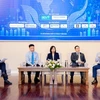Vietnam’s agriculture sector is keen on promoting advanced agricultural technologies, leaving huge investment opportunities for foreign investors, the Vietnam Investment Review reported.
Germany’s BASF, the world’s leading chemical company, launched its crop protection business in Vietnam last year as part of their efforts to boost yields per hectare, control weeds, and improve crop quality. BASF has now introduced its products throughout Vietnam.
Germany’s Bayer CropScience is also active in Vietnamese agriculture sector. The company has offered a wide range of products including high- value seeds, crop protection solutions.
Bayer Vietnam’s CropScience subsidiary underlined that the company would continue working with Vietnam’s government, localities and farmers to apply climate-smart agricultural technologies to act as a driver of green growth for the rapidly industrialising country, where 70 percent of the population relies on agriculture for making a living.
The growing investment trend in Vietnam’s agriculture is also highlighted by both local companies.
The Hoang Anh Gia Lai Group, one of leading private companies in Vietnam since 2013 has shifted its focus on farming business. The company has run a programme to raise 100,000 cattle. Doan Nguyen Duc, chairman of the group, estimated cattle-rearing would add 4 trillion VND (190.5 million USD) to the group’s annual revenues.
Tan Tao – an industrial local group that has virtually no experience in agriculture – surprised business circle when it announced the launch of ITA rice, a fragrant rice for exports. The group decided to cultivate rice on 60.3 hectares in the Mekong Delta province of Long An. The group also plans to expand its cultivation area to 5,000ha in the coming years.
Major transnational groups are also increasing their participation in Vietnam’s agricultural sector. Metro Cash & Carry is increasing investment in seafood, while Nestle is targeting coffee, and consumer giant Unilever is dipping its toes in the tea sector.
Vietnam is currently the second biggest rice exporters in the world after Thailand, and also the second largest coffee exporter following Brazil. The nation, in addition, is the biggest pepper exporter.-VNA
Germany’s BASF, the world’s leading chemical company, launched its crop protection business in Vietnam last year as part of their efforts to boost yields per hectare, control weeds, and improve crop quality. BASF has now introduced its products throughout Vietnam.
Germany’s Bayer CropScience is also active in Vietnamese agriculture sector. The company has offered a wide range of products including high- value seeds, crop protection solutions.
Bayer Vietnam’s CropScience subsidiary underlined that the company would continue working with Vietnam’s government, localities and farmers to apply climate-smart agricultural technologies to act as a driver of green growth for the rapidly industrialising country, where 70 percent of the population relies on agriculture for making a living.
The growing investment trend in Vietnam’s agriculture is also highlighted by both local companies.
The Hoang Anh Gia Lai Group, one of leading private companies in Vietnam since 2013 has shifted its focus on farming business. The company has run a programme to raise 100,000 cattle. Doan Nguyen Duc, chairman of the group, estimated cattle-rearing would add 4 trillion VND (190.5 million USD) to the group’s annual revenues.
Tan Tao – an industrial local group that has virtually no experience in agriculture – surprised business circle when it announced the launch of ITA rice, a fragrant rice for exports. The group decided to cultivate rice on 60.3 hectares in the Mekong Delta province of Long An. The group also plans to expand its cultivation area to 5,000ha in the coming years.
Major transnational groups are also increasing their participation in Vietnam’s agricultural sector. Metro Cash & Carry is increasing investment in seafood, while Nestle is targeting coffee, and consumer giant Unilever is dipping its toes in the tea sector.
Vietnam is currently the second biggest rice exporters in the world after Thailand, and also the second largest coffee exporter following Brazil. The nation, in addition, is the biggest pepper exporter.-VNA



















